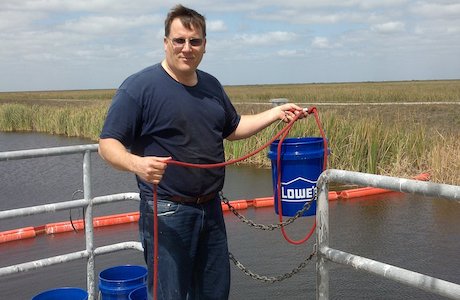Management Strategies for South Florida Marginal Agricultural Soils
-
Everglades Agricultural Region
The Everglades Agricultural Area was historically a seasonally-flooded wetland ecosystem, but was converted to agricultural use by drainage in the early 1900s.
Early studies at the Everglades UF/IFAS Research and Education Center documented that crops often failed to yield unless supplemented with many nutrients that were deficient in these soils. Subsidence of the organic soils occurred soon after drainage, which led to decreases in depth to the underlying bedrock limestone.
Some of the soils are becoming very shallow, and interaction with the underlying limestone has created conditions where particles of limestone are translocated into surface soils by tillage and evapotranspiration. The result is that the pH and nutrient retention capacity of these soils has increased, which tends to tie up nutrients in forms that are not readily available to crops, thus higher fertilization rates are often required.
-
South Florida and Indian River Region Sandy Soils
The sandy soils in south Florida - including those of the Indian River region - suffer from low organic matter content, which limits water-holding capacity and retention of nutrients. Coupled with typically elevated temperatures during summer months, organic matter from crop residues and amendments becomes rapidly decomposed, which further decreases soil quality.
Irrigation with saline groundwater has initiated high pH conditions in some surface soils, which further stress crops. Intensive water, fertilizer, and soil management of these marginal areas is necessary to optimize crop production.
Dr. Wright's research and Extension program focuses on identifying management strategies that can improve soil quality, while minimizing adverse environmental effects.

Dr. Alan Wright monitors water quality
Objectives
- Studying how crop management practices influence soil subsidence and oxidation
- Relationships between soil and water pH and nutrient uptake efficiency
- Identifying role of soil organic matter and amendments on improving soil quality

